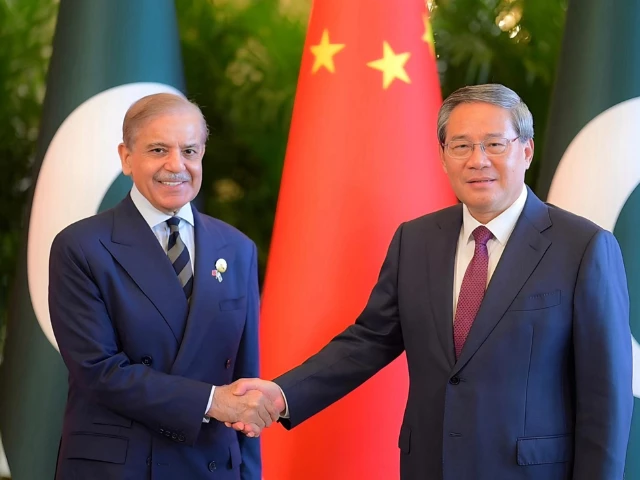Pakistan and China have signed multiple Memorandums of Understanding (MoUs) and joint ventures worth $8.5 billion to deepen business-to-business (B2B) collaboration in agriculture, industry, health, trade, mining, and minerals.
Addressing the signing ceremony in Beijing on Thursday, Prime Minister Shehbaz Sharif described the agreements as the “long march of economic development” between the two nations. “This long march will commence from Beijing and conclude in Islamabad,” he remarked.
The premier emphasized that this initiative aims to transform Pakistan into a thriving economy attracting billions in investment, creating millions of jobs, and strengthening the country’s financial foundations. “We are resolved to work tirelessly until this long march of economic development reaches its destination,” Shehbaz said.
Read more: PM looks to China for advanced disaster management technology
Highlighting the launch of CPEC 2.0, the Prime Minister underlined agriculture as a key pillar. “Agriculture is the backbone of Pakistan’s economy, contributing 60 percent to it. China has excelled in this sector,” he said. “I encourage Chinese companies to bring their experience, expertise, and investments to Pakistan to boost agricultural productivity, which will be a win-win for both countries.”
Shehbaz also pointed to Information Technology and Artificial Intelligence as emerging fields for enhanced cooperation. “China is a global leader in these areas, and Pakistan stands to benefit greatly from collaboration here,” he added. He further highlighted mining and minerals as areas with high potential for mutual investment.
Special Economic Zones (SEZs), he noted, are the pillars of CPEC 2.0. “Chinese industries can relocate to Pakistan and leverage a skilled yet cost-effective workforce. This is an opportunity for Chinese entrepreneurs to forge a win-win partnership,” the Prime Minister said.
Security assurances for Chinese nationals working in Pakistan were also conveyed. “Their safety is of paramount importance, and we will take all necessary measures,” Shehbaz stressed.
Also Read: ECP postpones Punjab by-elections due to devastating floods
The Prime Minister concluded by praising the vision of Chinese President Xi Jinping, crediting his leadership for the ongoing development and economic prosperity in China.
Earlier, both countries reaffirmed their commitment to strengthening bilateral cooperation by signing the Joint Action Plan 2024-2029.
The development builds on the consensus reached earlier this week in a meeting between President Xi Jinping and Prime Minister Shehbaz Sharif.
Moreover, Pakistan and China have expressed satisfaction over the positive trajectory of their ties and agreed to continue working closely on the next phase of the upgraded China-Pakistan Economic Corridor (CPEC 2.0), featuring five new corridors.
The understanding came during PM Shahbaz’s meeting with Chinese Premier Li Qiang in Beijing.
Read: 5.9 magnitude quake jolts Punjab, K-P
The PM expressed gratitude to the Chinese leadership and people for their unwavering support to Pakistan’s territorial integrity, sovereignty, and socio-economic development. He also congratulated China on the hosting of the SCO Council of Heads of State Summit in Tianjin and extended felicitations on the 80th anniversary of the success of the Chinese people in the War of Resistance and World’s Anti-Fascist War.
Highlighting the role of CPEC in Pakistan’s development over the past decade, Shehbaz stressed the need for early implementation of the ML-I project, KKH realignment and operationalization of Gwadar Port. He emphasized vast potential for B2B cooperation, citing agriculture, mines and minerals, textiles, the industrial sector and IT as priority areas. The premier also briefed his counterpart on the B2B Investment Conference held earlier in the day, which drew more than 300 Pakistani and 500 Chinese companies.
SCO summit
PM Shehbaz reached Tianjin on Saturday to attend the Shanghai Cooperation Organisation (SCO) summit.
The prime minister is accompanied by Deputy Prime Minister and Foreign Minister Ishaq Dar, Planning Minister Ahsan Iqbal, Information Minister Attaullah Tarar, and senior government officials. During the summit, the PM is to present Pakistan’s perspective on pressing regional and global issues, outlining strategies to strengthen the SCO’s role in fostering cooperation and stability.
The Shanghai Cooperation Organization (SCO), founded in 2001 by China, Russia, Kazakhstan, Kyrgyzstan, Tajikistan, and Uzbekistan, is a permanent intergovernmental body aimed at fostering political, economic, security, and cultural cooperation, while upholding the “Shanghai Spirit” of mutual trust, equality, and non-alignment.
Its supreme decision-making body is the Council of Heads of State, with the Secretariat in Beijing and the Regional Anti-Terrorist Structure in Tashkent serving as permanent institutions.
Today, the SCO includes 10 member states — including Pakistan, India, Iran, and Belarus — alongside two observer states and 14 dialogue partners. The organization has forged partnerships with international and regional bodies such as the United Nations (UN), the Association of Southeast Asian Nations (ASEAN), the Economic Cooperation Organization (ECO), and the Commonwealth of Independent States (CIS), formalized through multiple memoranda of understanding since 2005.

